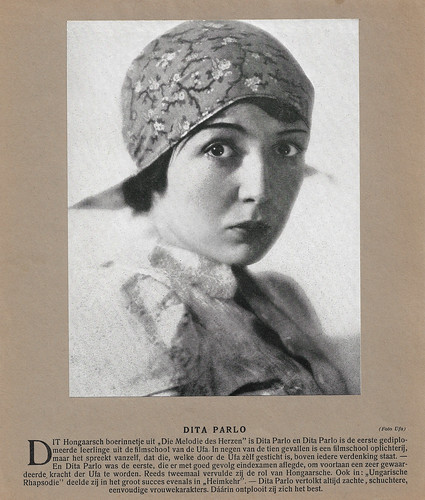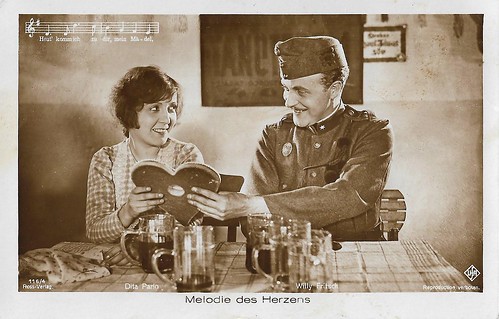It's Valentine's Day and we have a film special for everyone who loves romance... The German early sound film Melodie des Herzens/Melody of the Heart (Hanns Schwarz, 1929) which stars the lovely Dita Parlo and ‘Sunny Boy’ Willy Fritsch, Ufa's most often kissed star. The film started the wave of the über-romantic operetta films of the 1930s.

German collectors card in the series 'Vom Werden deutscher Filmkunst - Der Tonfilm', album no. 11, picture no. 4. Photo: Ufa / Ross Verlag. Dita Parlo and Willy Fritsch in Melodie des Herzens/Melody of the Heart (Hanns Schwarz, 1929).

Page of Dutch calendar, ca. 1930. We bought the pages at the VerzamelaarsJaarbeurs, The International Collectors Fair in Utrecht. The calendar had been part of the film memorabilia collection of the seller's father. Dita Parlo in Melodie des Herzens/Melody of the Heart (Hanns Schwarz, 1929).

Photo of a Dutch calendar, ca. 1930. Dita Parlo in Melodie des Herzens/Melody of the Heart (Hanns Schwarz, 1929).

German postcard by Ross Verlag, no. 116/2. Photo: Ufa. Willy Fritsch in Melodie des Herzens/Melody of the Heart (Hanns Schwarz, 1929).
In Melodie des Herzens/Melody of the Heart (Hanns Schwarz, 1929), Julia Balog (Dita Parlo), a young girl from the country, loses her job as a maid in pre-WWI Budapest, when she stays out too long with her beau, the soldier János Garas (Willy Fritsch), who is saving money to buy a horse to open a transport company.
After being unemployed and with rent long overdue, the landlady offers her a better job in a nightclub. Meanwhile, the János's family has decided that their son should marry the daughter of a rich farmer (Anni Mewes). When he finds out about Julia's profession, he accepts his parents' match after struggling with himself.
On the day of his engagement, Julia comes to his hometown with enough money to buy a horse, which leads to a conflict between Julia, the fiancee, her family, János himself and his parents.
Melodie des Herzens was shot in Hungary. The film was scripted by Hans Székely, cinematographed by Günther Rittau and Hans Schneeberger, and art direction was by Erich Kettelhüt. Initially, the film was intended to be silent, but halfway through production its producer Erich Pommer was ordered by his superiors to convert it into a sound film.
Pommer took over the production management, assisted by Max Pfeiffer, The interior shots were shot in 1928 at the Ufa studios in Neubabelsberg, today's Babelsberg studio in Potsdam, the exterior shots were taken in the country in Hungary and in Budapest. Pfeiffer also managed the recordings in Hungary. Fritz Thiery was responsible for the sound.
Melodie des Herzens was the first sound film produced by the German major studio Universum Film AG (Ufa) and the second German sound film. Willy Fritsch speaks the first words in the film: "Ich spare nämlich auf ein Pferd." (Because I'm saving on a horse.) The texts on Werner Richard Heymann's melodies come from, among others, Hans Székely, Fritz Grünbaum, Fritz Rotter, Arthur Rebner and Fritz Löhner-Beda.
The film was simultaneously shot in three more versions: in English (Melody of the Heart), French (Mélodie du cœur) and in Hungarian (Vasárnap délután). Such multiple-language versions, which had been pioneered by British International Pictures, were popular in Europe until dubbing became more widespread.
Filming of Melodie des Herzens began in June 1929 and ended in September of the same year. Melodie des Herzens had its German premiere on 16 December 1929. Not least because of its different language versions, the film became a success and a classic in Europe. Melodie des Herzens has been credited with establishing the popularity of the operetta film.

German postcard by Ross Verlag, no. 116/1. Photo: Ufa. Willy Fritsch and Dita Parlo in Melodie des Herzens (Hanns Schwarz, 1929).

German postcard by Ross Verlag, no. 116/3. Photo: Ufa. Willy Fritsch in Melodie des Herzens (Hanns Schwarz, 1929).

German postcard by Ross Verlag, no. 116/4. Photo: Ufa. Willy Fritsch and Dita Parlo in Melodie des Herzens (Hanns Schwarz, 1929).
And for my own Valentine, a big 💖!
Sources: Stephan Eichenberg (IMDb), Wikipedia (German and English) and IMDb.

German collectors card in the series 'Vom Werden deutscher Filmkunst - Der Tonfilm', album no. 11, picture no. 4. Photo: Ufa / Ross Verlag. Dita Parlo and Willy Fritsch in Melodie des Herzens/Melody of the Heart (Hanns Schwarz, 1929).

Page of Dutch calendar, ca. 1930. We bought the pages at the VerzamelaarsJaarbeurs, The International Collectors Fair in Utrecht. The calendar had been part of the film memorabilia collection of the seller's father. Dita Parlo in Melodie des Herzens/Melody of the Heart (Hanns Schwarz, 1929).

Photo of a Dutch calendar, ca. 1930. Dita Parlo in Melodie des Herzens/Melody of the Heart (Hanns Schwarz, 1929).

German postcard by Ross Verlag, no. 116/2. Photo: Ufa. Willy Fritsch in Melodie des Herzens/Melody of the Heart (Hanns Schwarz, 1929).
Earning enough money for a horse
In Melodie des Herzens/Melody of the Heart (Hanns Schwarz, 1929), Julia Balog (Dita Parlo), a young girl from the country, loses her job as a maid in pre-WWI Budapest, when she stays out too long with her beau, the soldier János Garas (Willy Fritsch), who is saving money to buy a horse to open a transport company.
After being unemployed and with rent long overdue, the landlady offers her a better job in a nightclub. Meanwhile, the János's family has decided that their son should marry the daughter of a rich farmer (Anni Mewes). When he finds out about Julia's profession, he accepts his parents' match after struggling with himself.
On the day of his engagement, Julia comes to his hometown with enough money to buy a horse, which leads to a conflict between Julia, the fiancee, her family, János himself and his parents.
Melodie des Herzens was shot in Hungary. The film was scripted by Hans Székely, cinematographed by Günther Rittau and Hans Schneeberger, and art direction was by Erich Kettelhüt. Initially, the film was intended to be silent, but halfway through production its producer Erich Pommer was ordered by his superiors to convert it into a sound film.
Pommer took over the production management, assisted by Max Pfeiffer, The interior shots were shot in 1928 at the Ufa studios in Neubabelsberg, today's Babelsberg studio in Potsdam, the exterior shots were taken in the country in Hungary and in Budapest. Pfeiffer also managed the recordings in Hungary. Fritz Thiery was responsible for the sound.
Melodie des Herzens was the first sound film produced by the German major studio Universum Film AG (Ufa) and the second German sound film. Willy Fritsch speaks the first words in the film: "Ich spare nämlich auf ein Pferd." (Because I'm saving on a horse.) The texts on Werner Richard Heymann's melodies come from, among others, Hans Székely, Fritz Grünbaum, Fritz Rotter, Arthur Rebner and Fritz Löhner-Beda.
The film was simultaneously shot in three more versions: in English (Melody of the Heart), French (Mélodie du cœur) and in Hungarian (Vasárnap délután). Such multiple-language versions, which had been pioneered by British International Pictures, were popular in Europe until dubbing became more widespread.
Filming of Melodie des Herzens began in June 1929 and ended in September of the same year. Melodie des Herzens had its German premiere on 16 December 1929. Not least because of its different language versions, the film became a success and a classic in Europe. Melodie des Herzens has been credited with establishing the popularity of the operetta film.

German postcard by Ross Verlag, no. 116/1. Photo: Ufa. Willy Fritsch and Dita Parlo in Melodie des Herzens (Hanns Schwarz, 1929).

German postcard by Ross Verlag, no. 116/3. Photo: Ufa. Willy Fritsch in Melodie des Herzens (Hanns Schwarz, 1929).

German postcard by Ross Verlag, no. 116/4. Photo: Ufa. Willy Fritsch and Dita Parlo in Melodie des Herzens (Hanns Schwarz, 1929).
And for my own Valentine, a big 💖!
Sources: Stephan Eichenberg (IMDb), Wikipedia (German and English) and IMDb.
No comments:
Post a Comment